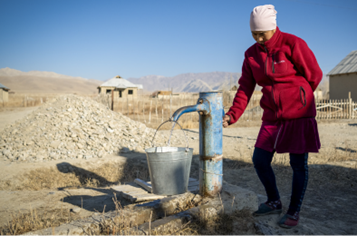e-MFP launches Financial Inclusion Compass 2018!
- Nov 26, 2018
- 3 min read

The Compass was conceived to be a way to leverage e-MFP’s multi-stakeholder membership and position in the inclusive finance community, while capturing too some of the dynamic debate from the workshops at the annual European Microfinance Week, giving a wide array of practitioners, investors, donors, academics and support service providers the opportunity to assess and describe the importance of various Trends, select and give opinions on New Areas of Focus, and provide open-comment qualitative input on the expected (and hoped-for) direction of financial inclusion progress.
In this sense, says report author and e-MFP Financial Inclusion Specialist Sam Mendelson, the Compass is a “not a crystal ball as much as it is a ‘time capsule’ – freezing in time what people working in inclusive finance see as important in the years ahead, so the sector can go back from year to year and see where it was wrong, and where it was right”.
The survey behind the Compass was conducted over the summer and was mixed-methodology, asking for scoring of particular trends, their importance and direction of progress, and ratings of selected future Areas of Focus. Finally, respondents were asked to give comments on a series of questions that looked at challenges, opportunities, medium-term forecasts, the relevant financial service providers of the future, a policy-making ‘wish list’, and longer-term hopes.
77 complete responses were received. A majority is based in European countries, and a plurality mainly focuses on Sub-Saharan Africa – with the rest spread among a global focus, South Asia and East Asia Pacific; MENA, Europe and Central Asia; and the Americas. A plurality of respondents works for a financial services provider, with consultants and support providers, funders, industry infrastructure organisations and academics or researchers making up most of the rest.
There are various interesting results in the paper – both quantitative and qualitative. But the first question, asking respondents to score and comment on the importance of selected trends, yielded an interesting Top Five – illustrated in Figure 1.

The scores – and the full list of trends – can be seen in Figure 2.

In New Areas of Focus, Figure 3 shows that Agri-finance was the dominant choice, with over 75 percent of respondents choosing it as one of their top five options, and it made up 18 percent of all the votes cast among the 14 options – 50 percent more than the second-highest choice. After Agri-finance, SME finance, Climate Change Adaptation/Mitigation, Housing Microfinance and Energy all scored highly. Some areas scored extremely low, including Finance for the Elderly, Fair Trade, and education.

Figure 3 New Areas of Focus Ranked
Various themes emerged from the research, including:
The FinTech revolution is a potential threat to end-clients and the sector overall, but is likewise an opportunity – for clients and for providers alike.
These include reduced operational costs that can be passed on to clients, better communication, greater outreach, opportunities in education, and innovations in risk assessment.
Client protection is seen as very important at the moment, and technology is the area most moving in the ‘right’ direction.
Agri-finance is the area in which financial inclusion can cause, or respond to, the most significant developments. SME Finance, Climate Change, Housing and Energy finance are all areas that face disruption and innovation.
Client protection, privacy, ensuring the value proposition of financial inclusion services, and preventing an erosion of the social focus of financial inclusion via a ‘race to the bottom’ in the face of new entrants, are all major challenges.
The financial service providers of the medium- term future will primarily be a mix of cooperatives, NGOs and local commercial banks. There is room for a range of providers, and no single model will triumph.
Improvement in quality and affordable (and perhaps mandatory) financial education is arguably the most important policy development that respondents would choose to implement if given the chance.
In the longer term, there is a strong hope for universal financial inclusion within a sector that maintains client-centricity and social mission – keeping an eye on the rationale for, and unique responsibilities inherent in, serving low-income customers.
The Platform’s hope is that the Compass will be a valuable teaching tool, and as it becomes an annual publication, will give useful insight into how perceptions change over time, and how the past can inform predictions of the future.
author: e-MFP





Comments